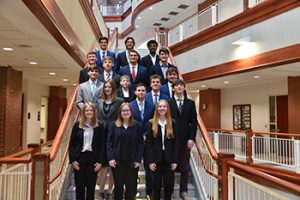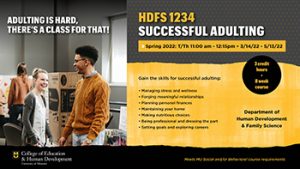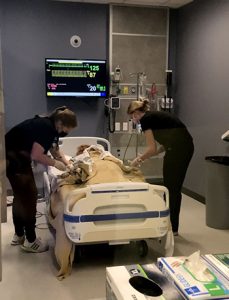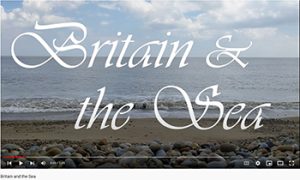Published on
Updated on
We reached out to deans and invited every college to share an innovative course that is being led by faculty and that would be interesting to colleagues from across campus. I wanted to give you all a glimpse into a sample of the rich mosaic of courses that our colleagues are teaching. This is only the very tip of the iceberg. I hope that these descriptions of particularly interesting courses from every corner of the university intrigue, surprise, and inspire you
College of Agriculture, Food and Natural Resources
Post-Normal Biochemistry
Instructors: Brenda Peculis, Associate Professor Emerita, Biochemistry, and Shari Freyermuth, Assistant Dean, Office of Academic Programs and Associate Teaching Professor, Biochemistry
Post-normal science refers to research and results that have influence far beyond the laboratory, impacting issues in law, ethics and public policy. In this seminar-style course, graduating seniors explore the intersection of science, politics and public attitudes. They apply their scientific training to explore issues that affect them as informed consumers and voters in a democratic society. There is peer teaching and their final project is to create a standalone presentation on a topic. This semester they are going to do biotech topics and their audience is non-major peers. Students had a Zoom conversation with Dr. Paul Offit this semester, who has written a number of books about science and medicine topics for the public, and is involved in several vaccine task forces.
College of Arts & Science
Britain and the Sea
Instructor: Robert Fletcher, Professor of History and Kinder Professor of British History
Britain and the Sea combines history, politics, literature, and film to tell the story of Britain’s relationship with the world’s seas and oceans. Each week students examine a different theme in modern British history, and focus on a different ship to help us understand that story: from famous warships and liners to forgotten fishing boats and plucky yachts. Britons still talk of themselves as an ‘island nation’ today, and key themes in the country’s past and present – trade and emigration, slavery and empire, fishing and the politics of Brexit – have played out through its relationship with the sea. This course explores those connections, but it also explores how the sea – and the idea of being a ‘maritime nation’ – still matter in Britons’ understandings of the world, and of their place within it.
Extra Credit: View a YouTube Playlist, including a trailer for the course and for each new theme within the course, set to music.
Trulaske College of Business
Professional Management Internship (International Trade Center)
Instructor: Jackie Rasmussen, International Trade Specialist

Each semester undergraduate students from across campus have the opportunity to intern with the MU International Trade Center (within the Robert J. Trulaske, Sr. College of Business) to complete semester-long global market research projects for Missouri companies seeking to expand their sales internationally. The research completed provides participating students with excellent hands-on learning opportunities in project management, teamwork, global market identification and evaluation, and industry analysis; better positioning them employment and career advancement. Likewise, for the participating companies, the research completed provides information they can use to effectively evaluate global market opportunities in a timely, meaningful and affordable way. Students have the opportunity to interact with company leaders during an initial company meeting/tour, mid-project meeting and during delivery of a final project presentation.
Extra credit: Read an additional news story connected with the course/internship opportunity.
Education and Human Development
Successful Adulting
Instructors: Kale Monk, Assistant Professor, Human Development & Family Science, and Melissa Herzog, Assistant Teaching Professor, Human Development & Family Science

Growing up is hard! We have a class for that!
During the college years, many students feel “in between” being a teen and being an adult. In HDFS 1234: Successful Adulting, students learn the practical skills to become an independent adult, like managing stress, communicating effectively in personal and professional relationships, doing taxes and managing other finances, maintaining a home, making nutritious cooking choices, being professional and dressing the part, as well as setting goals and exploring career readiness. This 8-week course will expose students to science-based information from across disciplines to educate them on the developmental milestones of emerging adulthood, and the expectations and definitions associated with “adulting” in the U. S.
Each week, students will learn from faculty experts in a variety of disciplines and complete engaging assignments focused on personal growth and reflection, and the acquisition of life skills not taught in a typical textbook. This course will be led by Drs. Kale Monk and Melissa Herzog, faculty in the Department of Human Development and Family Science. Faculty and staff from Nutrition & Exercise Physiology, Textile & Apparel Management, Architectural Studies, Personal Financial Planning, Labor & Workforce Development, and the MU Career Center will also provide crucial insights from their respective disciplines.
Enrollment is still occurring for Spring 2022, 2nd 8-week session!
College of Engineering
Leadership in Engineering
Instructor: Michael Poehlman, Adjunct Instructor
This course is offered in conjunction with the Novak Leadership Institute to help students be better prepared to succeed at completing their education, but they will also be more equipped to hit the ground running when they begin their careers. The course offered this spring (Engineering Leadership and Strategic Communication) is an offshoot of a course that Novak has successfully been teaching in the Journalism school, but with a twist…guest speakers. This semester there are 6 of them scheduled throughout the course. The students really appreciate the industry and personal connections the speakers provide.
Students will be encouraged to interact with the industry guests as they learn to identify their own leadership strengths and weaknesses by doing hands-on activities such as a “Big Goal Exercise,” “DISC Behavioral Assessment Reflection,” and personal organization.
Extra credit: In a sneak preview of the course for Fall 22, Poehlman says, I’m planning to make the course more engineering specific by adding some additional engineering books to the textbook requirement and making sure the exercises are engineering related. I also plan to manage the guest speaker component more effectively by having them cover the required content in the syllabus.
School of Health Professions
Public Health Capstone: Digital Storytelling
Instructor: Lise Saffran, Associate Teaching Professor, Public Health
One of the primary tasks of the public health professional is to translate scientific evidence into sound programs and policies. To do this successfully, the public health practitioner must understand how to weigh and interpret evidence and how to communicate the meaning of that evidence to a variety of stakeholders, including policy makers and community members. This capstone will focus on the practical and ethical challenges inherent in public health practice through a focus on communication and storytelling. Students will choose a public health topic and conduct a literature review, conduct interviews with key stakeholders, develop a story proposal and a completed digital story that reflects current evidence and diverse viewpoints. In addition, through exercises, readings and reflection papers, they will explore their own relationship to the issue of choice, explore unfamiliar points of view on the topic and grapple with the ethical challenges of advocacy and representation.
Extra credit: Read more about public health storytelling in a Show Me Mizzou story from last year.
Missouri School of Journalism
MOJO AD STAFF
Instructors: Jamie Flink, Associate Professor, Strategic Communication, and Jon Stemmle, Faculty Group Chair, Strategic Communication
MOJO Ad is a full-service student-staffed advertising agency at the University of Missouri School of Journalism where students work under the supervision of faculty who have all worked in the advertising and PR industries. Competing student teams spend the semester developing an integrated strategic communication campaign for a national client. Since the agency specializes in all things young, the target for these campaigns is always the youth and young adult (YAYA) audience made up of those ages 18 to 24.
Our goal is to provide students with an experience that simulates what they would be doing in the real world with a strong emphasis on industry best practices. They conduct extensive secondary and primary research including a nationally representative quantitative survey and qualitative in-depth interviews before developing creative and media recommendations. Students end the semester with each team making a formal 30-minute pitch to the client to convince them why their campaign is the best option.
We seek to find clients and challenges that students will find exciting. They’ve explored how AT&T 5G can enhance the health and wellness journey for students on college campuses, attracted young female drivers to Chevrolet and helped WarnerMedia launch the latest film in the Harry Potter/Wizarding World series Fantastic Beasts: The Secrets of Dumbledore. The student work from campaigns done in the class have won 14 American Advertising Federation awards through the KC Ad Club in the last two years, two of which went to the national competition.
Extra credit: View information about courses, open positions and their clients on the Mojo Ad website.
Graduate School
Preparing Future Faculty
Instructor: Lissa Behm-Morawitz, Professor, Department of Communication and Associate Dean in the Graduate School
Navigating the academic job market can be overwhelming, and some facets of faculty life and academe are not well understood by doctoral students and postdocs. The Graduate School’s Preparing Future Faculty (PFF) Seminar Program, consisting of GRAD 9010 and GRAD 9020, provides doctoral students and postdocs with the knowledge they need to successfully transition to a faculty career. The PFF Seminar introduces students to the different types of U.S. higher education institutions, roles and responsibilities of faculty members, tenure and promotion processes, mentorship training, job market preparation, strategies for communicating their scholarship, and skills to balance time and responsibilities. The PFF Seminar courses offer experiential learning through activities such as mock interviews with MU faculty and elevator/micro speeches. All PFF Seminar participants complete an Individual Development Plan (IDP) to assist them in setting goals and navigating resources to help accomplish those goals in pursuit of a faculty career.
Extra credit: Read more about the program and how to apply on the Graduate School website.
Law School
Sports Law
Instructor: Ilhyung Lee, Director, Center for the Study of Dispute Resolution & Edward W. Hinton Professor of Law
The Sports Law course addresses various legal issues that frequently arise in the sports arena, both professional and amateur (mainly intercollegiate), including commissioner authority, contracts, antitrust, labor, dispute resolution, intellectual property, agents, NCAA governance, and Title IX. In previous years, we have been fortunate to welcome informative guest speakers from the commissioner’s office, major professional sports teams, private practice, and intercollegiate athletic departments.
School of Medicine
Project Management
Instructor: Patricia Alafaireet, Associate Professor, Department of Health Management and Informatics

This class focuses on project management in healthcare, but the skill set can be applied to many fields and even to personal life. This course is designed to provide an in-depth understanding of the fundamentals of project management as well as skills in the areas of leadership, personal accountability, and effective communications. A problem-based approach is used to frame both the theoretical underpinnings of project management and its hands-on, practical application. This format allows for extensive interaction and team-based learning. Students also develop an understanding of the foundations of project management designed to enable them to successfully complete a professional certification exam to become a certified project manager. Course content includes project scope development, project work breakdown, financial control, and human resources management.
School of Nursing
Fundamentals of Nursing
Instructors: Sue Yun Fowler, Instructor of Nursing, and Hillary Claunch, Instructor of Nursing

Fundamentals of Nursing is an ultimate “Show-Me” course, which combines active-learning lectures with skills lab, simulation, and clinical experiences to provide a foundation of nursing knowledge and skill development and application. Students apply the nursing process to develop a plan of care for a variety of patient scenarios when learning new skills in lab and to take care of patients in a simulated environment. Students also demonstrate skill mastery and apply knowledge to provide hands-on care to patients in clinical settings based on practice standards and professional code of ethics.
For example, students learn the principles of medication administration in lecture; practice different types of injections in skills lab; and administer an injection to a manikin during a high-fidelity simulation and with an instructor to an actual patient in clinical. Students continue to build upon this foundation of knowledge and skills in subsequent courses and semesters through leveled simulations and specialized clinical experiences.
College of Veterinary Medicine
Shelter Medicine Clinical Rotation
Instructor: Amie Burling, Assistant Teaching Professor of Shelter Medicine
The Shelter Medicine Clinical Rotation (VMS 6414) is a required course taught to 3rd and 4th year veterinary students completing their final clinical rotations before graduating with the degree of Doctor of Veterinary Medicine. The students spend the rotation off campus learning about the care of dogs and cats in animal shelters and the veterinary involvement necessary to prepare these animals for adoption. Under the direct supervision of faculty veterinarians and technicians, the students conduct physical examinations, provide treatment for conditions such as eye injuries, ear mites, and respiratory disease, and perform anesthesia and surgery. Students gain surgical experience and provide needed procedures including spays, neuters, dentals, and amputations. Other topics covered in the course through hands-on experience and discussion include behavioral health of dogs and cats, biosecurity, public health, shelter operations, management of free-roaming outdoor cats, professional wellbeing, and the One Health link between human and animal welfare. Partner organizations for this course include the Central Missouri Humane Society, Second Chance, Adair County Humane Society, and other rescue groups and shelters in the mid-Missouri area. The goal of this course is to instill in veterinary students the clinical skills and desire for community involvement throughout their professional careers while addressing the immediate needs of Missouri’s shelter animals and communities.
Extra credit: View a video about the Shelter Medicine program
